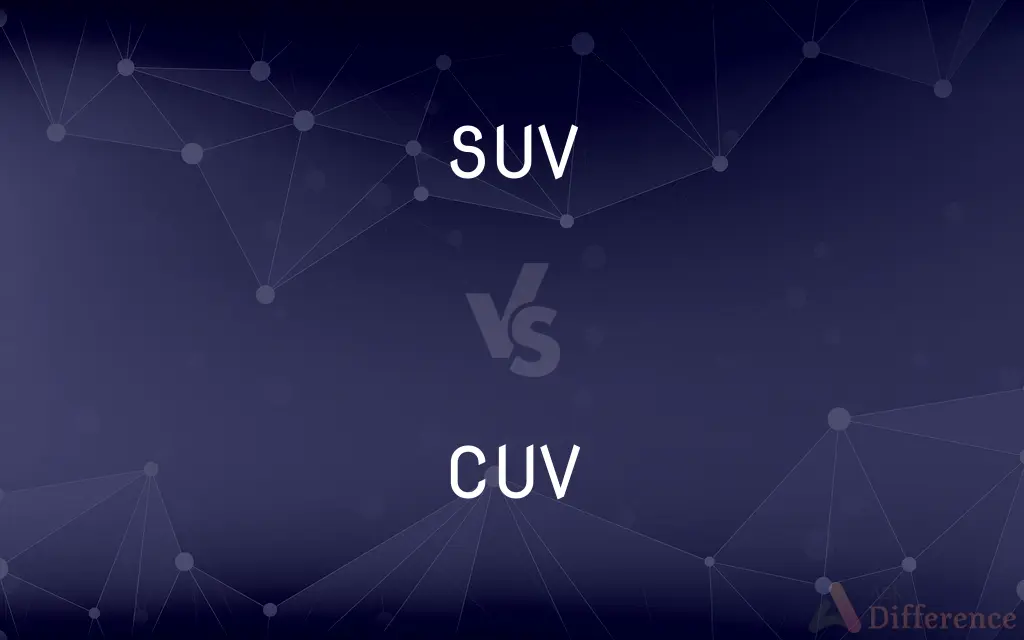SUV vs. CUV — What's the Difference?
Edited by Tayyaba Rehman — By Fiza Rafique — Published on November 16, 2023
SUV stands for Sport Utility Vehicle, traditionally built on a truck chassis, designed for off-roading. CUV, or Crossover Utility Vehicle, is car-based, offering a blend of SUV-like capacity with sedan comfort.

Difference Between SUV and CUV
Table of Contents
ADVERTISEMENT
Key Differences
SUV, or Sport Utility Vehicle, typically possesses a body-on-frame design, originating from its roots as a vehicle built for rough terrains and off-road capabilities. In contrast, CUV, known as Crossover Utility Vehicle, merges the high-clearance design of an SUV with the unibody construction of passenger cars, making it more urban-centric.
When discussing drivability, SUVs, with their rugged build, offer superior off-road capabilities, especially with four-wheel drive. CUVs, however, provide a smoother ride more akin to passenger cars, catering to city drivers and highway cruises. This distinction also affects fuel efficiency, where the lighter CUV generally boasts better mileage than its SUV counterpart.
Aesthetically, SUVs often exude a more muscular and robust appearance, indicative of their utility nature and off-road prowess. CUVs, borrowing design elements from both SUVs and sedans, tend to have a more streamlined and modern look, appealing to a wider audience seeking style without sacrificing space.
On the inside, both SUVs and CUVs offer ample space, but the former might present a more rugged interior, keeping in line with its utilitarian origin. In comparison, CUV interiors often mirror the comfort and features one might expect in a contemporary sedan.
Safety is paramount in both categories. While SUVs are built to handle challenging terrains, CUVs focus on urban safety features like collision avoidance systems. It's essential to note that both vehicles, due to their size, may handle differently than smaller cars, especially in emergency maneuvers.
ADVERTISEMENT
Comparison Chart
Definition
Sport Utility Vehicle
Crossover Utility Vehicle
Build Design
Body-on-frame (like trucks)
Unibody (like sedans)
Primary Use
Off-road and utility
Urban driving and highway cruising
Appearance
Rugged, robust
Streamlined, modern
Drive Feel
Truck-like, suitable for rough terrains
Car-like, smoother ride
Compare with Definitions
SUV
SUVs prioritize utility and function.
The SUV's spacious cargo area was perfect for their camping gear.
CUV
CUVs are built using a unibody design.
The CUV offers a smoother drive, thanks to its unibody construction.
SUV
SUVs are vehicles designed for off-road capabilities.
The SUV effortlessly traversed the mountain trail.
CUV
CUVs are tailored for city and highway driving.
For daily commuting, he preferred the fuel-efficient CUV.
SUV
SUVs typically have a body-on-frame construction.
Due to its sturdy build, the SUV can handle tough terrains.
CUV
CUVs prioritize urban safety and convenience features.
The CUV's advanced safety features made it a top choice for families.
SUV
SUVs often come with an option for four-wheel drive.
She chose the SUV for its four-wheel-drive feature for winter trips.
CUV
CUVs offer a more modern and sleek design.
The latest CUV model boasts a futuristic design.
SUV
SUVs can be larger and more robust in appearance.
He wanted an SUV for its dominating road presence.
CUV
CUVs combine features of SUVs and passenger cars.
She loved the CUV for its blend of space and comfort.
SUV
A four-wheel-drive vehicle with a roomy body, designed for off-road travel.
Common Curiosities
Is an SUV better for off-roading?
Yes, SUVs are typically designed with off-roading capabilities in mind.
Do CUVs offer a smoother ride?
Yes, CUVs often provide a smoother, car-like ride compared to SUVs.
What does SUV stand for?
SUV stands for Sport Utility Vehicle.
Which is more fuel-efficient, SUV or CUV?
Generally, CUVs are more fuel-efficient than SUVs due to their lighter build.
Which vehicle type is larger?
SUVs are typically larger and more robust than CUVs.
And CUV?
CUV stands for Crossover Utility Vehicle.
Which is better for city driving?
CUVs are generally more suited for city driving due to their design and efficiency.
Are CUVs safer than SUVs?
Both can be safe, but CUVs often incorporate urban safety features, while SUVs are built rugged for challenging terrains.
Do SUVs have a higher towing capacity?
Typically, SUVs have a higher towing capacity than CUVs because of their rugged construction.
Which has more cargo space, SUV or CUV?
Generally, SUVs offer more cargo space, but CUVs provide ample room for most needs.
Can CUVs handle rough terrains?
While not primarily designed for it, many CUVs can handle mild off-roading, but not as proficiently as SUVs.
Which is more expensive, SUV or CUV?
Prices can vary, but SUVs, especially luxury or larger models, can be more expensive than CUVs.
Are CUVs a newer concept than SUVs?
Yes, CUVs have gained popularity more recently as a blend of SUVs and sedans.
Is a CUV just a smaller SUV?
Not exactly. While size can differ, the main distinction is in the build design and intended use.
Are all SUVs four-wheel drive?
No, not all SUVs are four-wheel drive, though many offer it as an option.
Share Your Discovery

Previous Comparison
Fundamental Particles vs. Elementary Particles
Next Comparison
Iced Tea vs. Sweet TeaAuthor Spotlight
Written by
Fiza RafiqueFiza Rafique is a skilled content writer at AskDifference.com, where she meticulously refines and enhances written pieces. Drawing from her vast editorial expertise, Fiza ensures clarity, accuracy, and precision in every article. Passionate about language, she continually seeks to elevate the quality of content for readers worldwide.
Edited by
Tayyaba RehmanTayyaba Rehman is a distinguished writer, currently serving as a primary contributor to askdifference.com. As a researcher in semantics and etymology, Tayyaba's passion for the complexity of languages and their distinctions has found a perfect home on the platform. Tayyaba delves into the intricacies of language, distinguishing between commonly confused words and phrases, thereby providing clarity for readers worldwide.











































